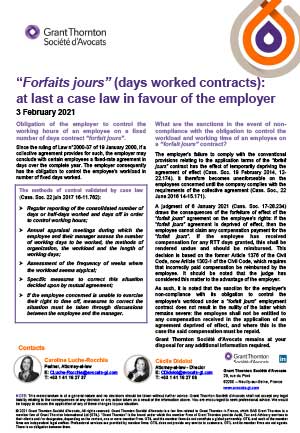-
Tax Policy Management
Tax Policy Management
-
Growth Management
Growth Management
-
Tax audit and litigation
Tax audit and litigation

-
Definition of a strategic and secure transfer pricing structure
Definition of a strategic and secure transfer pricing structure
-
Assistance in the development of international activities and operational reorganisations – “Business restructuring”
Assistance in the development of international activities and operational reorganisations – “Business restructuring”
-
Defense of practices and assistance in the context of tax audits and their follow-up from a litigation viewpoint
Defense of practices and assistance in the context of tax audits and their follow-up from a litigation viewpoint
-
Annual declaration and documentation obligations
Annual declaration and documentation obligations

-
Domestic and international VAT applicable to your company's flow
Domestic and international VAT applicable to your company's flow
-
Banking and financial VAT, VAT in the insurance sector
Banking and financial VAT, VAT in the insurance sector
-
VAT related to real estate registration fees
VAT related to real estate registration fees
-
VAT in the public and non-profit / association sector
VAT in the public and non-profit / association sector
-
Tax audit, tax litigation and relations with the Tax authorities
Tax audit, tax litigation and relations with the Tax authorities
-
Applicable rules for invoicing
Applicable rules for invoicing
-
Customs issues related to your company's international flows
Customs issues related to your company's international flows
-
French VAT registration and compliance obligations
French VAT registration and compliance obligations
-
Payroll tax
Payroll tax
-
Other indirect taxation
Other indirect taxation

-
Company transfer diagnosis
Company transfer diagnosis

-
Distribution strategy : Implementing and structuring
Distribution strategy : Implementing and structuring
-
Distribution activities digitalisation
Distribution activities digitalisation
-
Relations between suppliers and distributors
Relations between suppliers and distributors
-
Contractual policy : etablishing and structuring
Contractual policy : etablishing and structuring
-
Controls and litigation regarding payment terms
Controls and litigation regarding payment terms
-
Organising and securing commercial relations with consumers
Organising and securing commercial relations with consumers
-
Data protection - GDPR
Data protection - GDPR
-
Commercial Leases
Support in the management and contract management of commercial leases.

-
Traditional Services offered
Traditional Services offered
-
Health at work and quality of life at work
Health at work and quality of life at work
-
HR Management Audit
HR Management Audit
-
HR Engineering and People Change
Implementing managerial solutions in line with the company's strategic challenges
-
Management of HR compliance and internal investigations (harassment, discrimination, and whistleblowing)
Management of HR compliance and internal investigations (harassment, discrimination, and whistleblowing)

-
Advice on legal structuring
Advice on legal structuring
-
Day to day company management
Day to day company management
-
Companies reorganisation
Companies reorganisation
-
Mergers & Acquisitions - Private Equity
Mergers & Acquisitions - Private Equity
-
Changes in shareholder structure - Securities issue
Changes in shareholder structure - Securities issue
-
Governance and legal risks management
Governance and legal risks management

-
Development of an international mobility policy
Development of an international mobility policy
-
Coordination of reporting obligations for employees in a mobility situation
Coordination of reporting obligations for employees in a mobility situation
-
Advice on social security
Advice on social security
-
Assistance in labour law
Assistance in labour law

-
Management and protection of your portfolio of property rights
We put the most appropriate protection policy in place for our clients’ intellectual property rights.
-
Securing your projects: advisory and drafting of agreement services
We advise you on the feasibility of your project and the securing of your intellectual property and IT rights.
-
Enforcement of your rights: pre-litigation and litigation
Enforcement of your rights: detection of infringement, pre-litigation and litigation

Obligation of the employer to control the working hours of an employee on a fixed number of days contract “forfait jours”.
Since the ruling of Law n°2000-37 of 19 January 2000, if a collective agreement provides for such, the employer may conclude with certain employees a fixed-rate agreement in days over the complete year. The employer consequently has the obligation to control the employee's workload in number of fixed days worked.
The methods of control validated by case law (Cass. Soc. 22 juin 2017 16-11.762):
- Regular reporting of the consolidated number of days or half-days worked and days off in order to control working hours;
- Annual appraisal meetings during which the employee and his manager assess the number of working days to be worked, the methods of organization, the workload and the length of working days;
- Assessment of the frequency of weeks where the workload seems atypical;
- Specific measures to correct this situation decided upon by mutual agreement;
If the employee concerned is unable to exercise their right to time off, measures to correct the situation must be taken through discussions between the employee and the manager.
What are the sanctions in the event of non-compliance with the obligation to control the workload and working time of an employee on a “forfait jours” contract?
The employer's failure to comply with the conventional provisions relating to the application terms of the “forfait jours” contract has the effect of temporarily depriving the agreement of effect (Cass. Soc. 19 February 2014, 12-22.174). It therefore becomes unenforceable on the employees concerned until the company complies with the requirements of the collective agreement (Cass. Soc., 22 June 2016 14-15.171).
A judgment of 6 January 2021 (Cass. Soc. 17-28.234) draws the consequences of the forfeiture of effect of the “forfait jours” agreement on the employee's rights: if the “forfait jours” agreement is deprived of effect, then the employee cannot claim any compensation payment for the “forfait jours”. If the employee has received compensation for any RTT days granted, this shall be rendered undue and should be reimbursed. This decision is based on the former Article 1376 of the Civil Code, now Article 1302-1 of the Civil Code, which requires that incorrectly paid compensation be reimbursed by the employee. It should be noted that the judge has considered this matter to the advantage of the employer.
As such, it is noted that the sanction for the employer’s non-compliance with its obligation to control the employee's workload under a “forfait jours” employment contract does not result in the nullity of the latter which remains severe: the employee shall not be entitled to any compensation received in the application of an agreement deprived of effect, and where this is the case the said compensation must be repaid.
Grant Thornton Société d’Avocats remains at your disposal for any additional information required.
Authors: Caroline Luche-Rocchia, Partner, Attorney-at-law, and Cécile Didolot, Director Attorney-at-law.
















